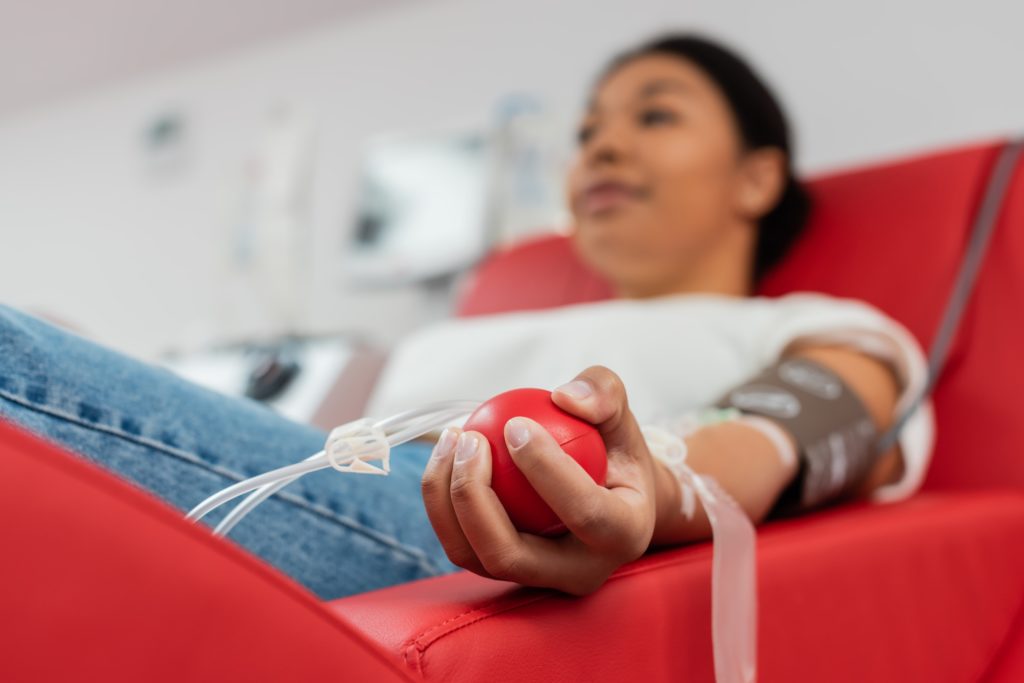
We appreciate the generosity and sense of community that brings blood donors to LifeShare. In addition, your health is very important to us. We perform a mini-health exam on every potential donor to ensure you can donate blood without compromising your health.
Our mini-exams include taking your temperature, blood pressure, and heart rate. We also check the iron level in your blood to ensure your iron levels after the donation won’t be too low. Your hemoglobin level for donation eligibility is based on your biological sex and weight. The last thing we want is for one of our neighbors to start feeling anemic after a blood donation.
What Is Anemia?
Hemoglobin in your red blood cells allows them to distribute life-giving oxygen from your lungs to all the different parts of your body. You can be anemic if you don’t have enough hemoglobin (or enough healthy red blood cells to transport it efficiently). There are many causes of anemia, ranging from temporary shortages to serious long-term medical conditions.
What causes anemia?
Several conditions can result in anemia. The severity and persistence of the anemia will depend upon your anemia type. The main types are listed below.
- Iron deficiency anemia
- Vitamin deficiency anemia
- Aplastic anemia
- Sickle cell anemia
- Thalassemia
Some types of anemia, like the iron and vitamin deficiency kinds, can resolve with dietary changes or by taking supplements. Other types are more serious and may need temporary or even lifelong treatment. Interestingly, sometimes that treatment requires blood transfusions, which is another reason to urge everyone you know to donate blood if they’re able!
So, Can You Donate Blood at LifeShare if You Are Anemic?
Unfortunately, if the hemoglobin test we do before a donation shows that your blood iron levels are too low, we won’t be able to accept your donation. We encourage you to go home, eat a well-balanced diet with plenty of iron-rich foods, and reschedule your donation for later. There will always be a need for blood! Contact us if you have questions about our donation process or want to know how you can help spread the word about the importance of blood donations.
Symptoms of Anemia
If you’re anemic, you may notice some of the following symptoms.
- Fatigue or general tiredness
- Weakness
- Lack of energy (mental and/or physical)
- Difficulty focusing or paying attention
- Headaches
- Shortness of breath
- Dizziness
- Chest pain or irregular heartbeat
- Cold hands and feet
- Paleness
Are Anemia and Iron Deficiency Anemia the Same Thing?
Anemia means not having enough healthy red blood cells to move oxygen efficiently around your body. Anemia can result from having too few red blood cells, from red blood cells that are unhealthy, or from a lack of sufficient hemoglobin within those blood cells. It may even involve more than one of these factors.
Iron deficiency anemia is a specific type of anemia where your red blood cells don’t have enough hemoglobin to move oxygen throughout your body properly.
What is Hemoglobin?
Hemoglobin is the molecule that allows red blood cells to carry oxygen throughout your body. Without this vital iron and protein component of red blood cells, your organs and other tissues cannot get the oxygen they need to function properly — or even to survive! This is why the answer to “Can anemics donate blood?” is always no, at least until their bodies are producing adequate hemoglobin for their own use.
How to Increase Your Iron Level
Eating a well-balanced, nutritious diet will help increase your iron levels. Foods such as red meat, liver, eggs, and seafood are especially good sources of iron. Other iron-rich foods include beans and other legumes, tofu, and many types of fruits and vegetables. Taking iron supplements can also help, although you should check with your doctor if your iron levels are especially low or if you have symptoms of anemia.
Image Credit: LightField Studios, Shutterstock